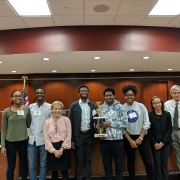National Consumers League supports table saw safety standard proposed by the Consumer Product Safety Commission
December 8, 2023
Media contact: National Consumers League – Melody Merin, melodym@nclnet.org, 202-207-2831
Washington, DC – The National Consumers League (NCL) submitted comments to the Consumer Product Safety Commission (CPSC) this week on the Commission’s proposed rule to require a safety standard for all table saws. The “Safety Standard Addressing Blade-Contact Injuries on Table Saws” proposal is projected to prevent more injuries and save more money than any rule ever proposed at the agency.
“NCL applauds the CPSC for moving toward a final rule to make table saws safe and to prevent the over 50,000 injuries – many of them finger amputations – that occur each year from table saw accidents,” said NCL CEO Sally Greenberg.
Pam Gilbert, NCL Board member and former Executive Director of the CPSC noted, “The matter of table saw safety has been an ongoing concern of the CPSC and National Consumers League for more than a decade; we believe this rule would finally bring much-needed safety technology to this ubiquitous woodshop tool found in millions of US households.”
Previous voluntary standards have been ineffective in preventing injuries, thus the need for this mandatory safety standard using proven effective technology that prevents serious injuries from table saws. Indeed, a 15-year trend analysis (from 2004 to 2018) of table saw injuries showed no reduction in table saw injuries from 2010 to 2018, despite the fact that a voluntary standard that became effective in 2010 required new table saws to be equipped with modular blade guard systems.
The Commission expects that the proposed rule would prevent or mitigate an estimated 49,176 injuries treated in hospital emergency departments or other medical settings per year and that net cost benefits, even when factoring the cost of the technology, would range from $1.28 billion to $2.32 billion per year.
The proposed rule would limit the depth of cut of a table saw to 3.5 mm or less when a test probe, acting as surrogate for a human finger or other body part, contacts the spinning blade at an approach rate of 1 m/s. CPSC staff estimated that the proposed rule would prevent or mitigate the severity of 54,800 medically treated blade-contact injuries annually.
To read the views of woodworkers themselves, this YouTube link tells first-hand accounts, some of which have been included in NCL’s comments. One is below:
“My father cut all four of his fingers off with a Radial arm saw years ago. Three fingers are bolted back together so he can only move them at the knuckle, the index finger was lost due to infection. He had to have a skin graft on all his fingers pulled from his thigh, so they now all grow hair so he has to shave them otherwise they grow hair. In airports, he always sets off the metal detectors. When I was looking at table saws about 8 years ago it was between the sawstop contractor (hybrid wasn’t out yet) and Powermatic 3hp cabinet. My father was with me at the time while I was a teenager at woodcraft. One look at his hand and it was obvious which saw I walked out with. 8 years later I still use the Sawstop contractor saw and it looks just like when I bought it, Its a fantastic investment and probably the only one that is relatively easy to justify to your wife. “
As Commissioner Rich Trumka, himself a woodworker, observed in his comments “…[t]he rule would provide the greatest net benefit to society of any rule in the agency’s history that I’m aware of—up to a $2.32 billion net benefit every year.”
The National Consumers League fully supports this Proposed Rule and greatly appreciates the years of dedication and work from the CPSC’s engineers, statisticians, and economists and the leadership of CPSC Chair Alex Hoehn Saric in moving this to the top of the Commission’s agenda.
NCL’s comments can be found here.
###
About the National Consumers League (NCL)
The National Consumers League, founded in 1899, is America’s pioneer consumer organization. Our mission is to protect and promote social and economic justice for consumers and workers in the United States and abroad. For more information, visit nclnet.org.
















